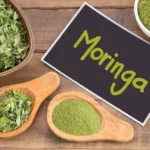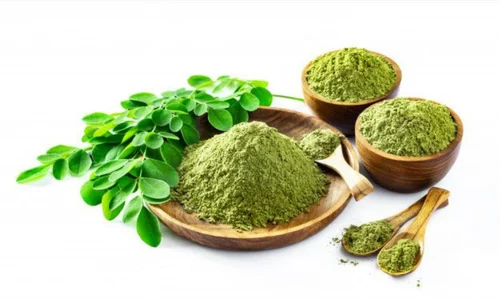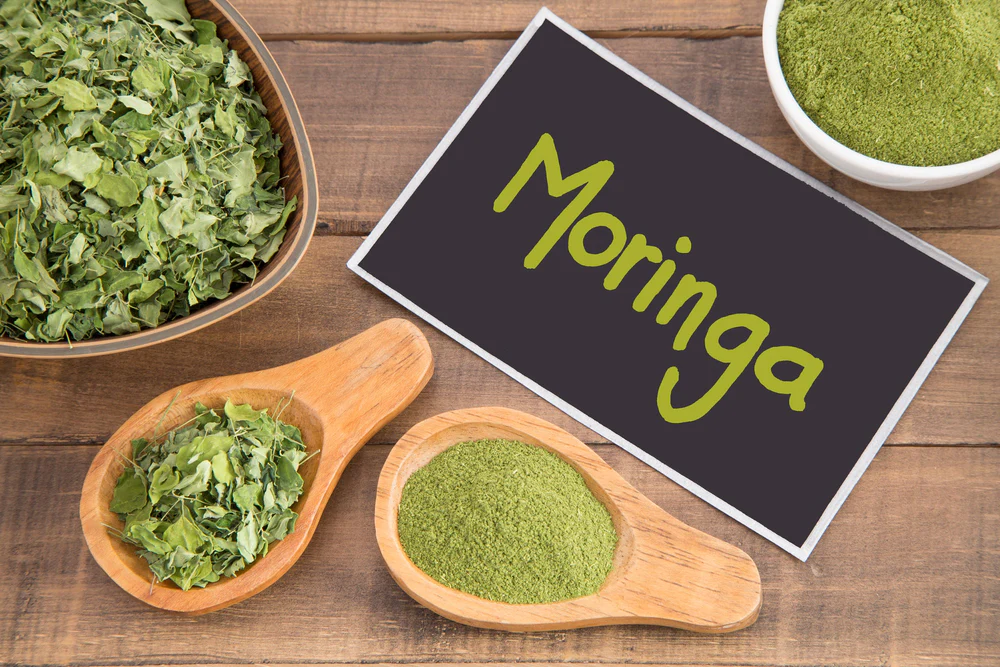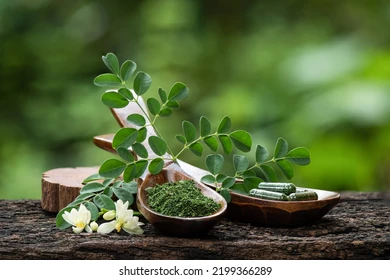The Moringa Marvel is capturing the attention of health-conscious individuals worldwide, serving as a superfood that condenses a multitude of benefits into a compact, nutrient-dense form. Known also as the “drumstick tree” or “horseradish tree,” Moringa oleifera’s transformation into a versatile powder form is what sets it apart. This article will dive into the wonders of Moringa powder, highlighting its remarkable health advantages and offering tips on seamlessly integrating it into your daily lifestyle.
Introduction: Unveiling the Moringa Marvel
Moringa oleifera, native to the Indian subcontinent, has been used for centuries in traditional medicine for its therapeutic properties. In recent years, it has gained global recognition as a nutritional powerhouse. The Moringa tree is known for its rapid growth and adaptability, thriving in various climates, which makes it an accessible source of nutrition worldwide.
Table of Contents
The Nutritional Powerhouse: What Is Moringa Powder?
Moringa powder is a finely ground, vibrant green powder derived from the leaves of the Moringa oleifera tree. This unassuming tree, often referred to as the “drumstick tree” or “horseradish tree,” is native to the Indian subcontinent but is now cultivated and cherished worldwide for its incredible nutritional value.
The Transformation Process
The journey of Moringa leaves from tree to powder involves a meticulous process. First, the fresh leaves are carefully harvested to ensure their peak nutritional content. Next, they are cleaned and thoroughly dried in controlled conditions to preserve their goodness. Once dried, the leaves are finely ground into a powder, resulting in a concentrated source of nutrition that can easily be incorporated into various dishes and beverages.
A Treasure Trove of Nutrients
Moringa powder is celebrated for its exceptional nutrient content, making it a true superfood. Let’s take a closer look at what you’ll find in this green gem:
1. Vitamins: Moringa powder is rich in essential vitamins, including vitamin A, vitamin C, and vitamin E. These vitamins play crucial roles in maintaining healthy skin, supporting the immune system, and protecting cells from oxidative stress.
2. Minerals: This superfood also boasts an array of essential minerals like calcium, potassium, and iron. Calcium supports strong bones and teeth, potassium helps regulate blood pressure, and iron combats fatigue by aiding in oxygen transport throughout the body.
3. Amino Acids: Moringa contains all nine essential amino acids, making it a valuable source of complete protein. Amino acids are the building blocks of proteins and are vital for muscle growth, repair, and overall well-being.
4. Antioxidants: Loaded with antioxidants such as quercetin, chlorogenic acid, and beta-carotene, Moringa powder helps combat oxidative stress and reduces the risk of chronic diseases. These antioxidants neutralize harmful free radicals in the body.
A Low-Calorie, Nutrient-Dense Option
One of the remarkable aspects of Moringa powder is its low-calorie content coupled with its high nutrient density. It allows you to enjoy a wide range of essential nutrients without adding excessive calories to your diet, making it an ideal choice for those looking to boost their nutrition without compromising on taste.
In summary, Moringa powder is a nutritional powerhouse that encapsulates the incredible benefits of the Moringa oleifera tree. Packed with vitamins, minerals, amino acids, and antioxidants, it’s a versatile superfood that can be effortlessly integrated into your daily routine. Whether you choose to blend it into smoothies, brew it as tea, or sprinkle it onto your meals, Moringa powder offers a convenient and delicious way to enhance your overall well-being.
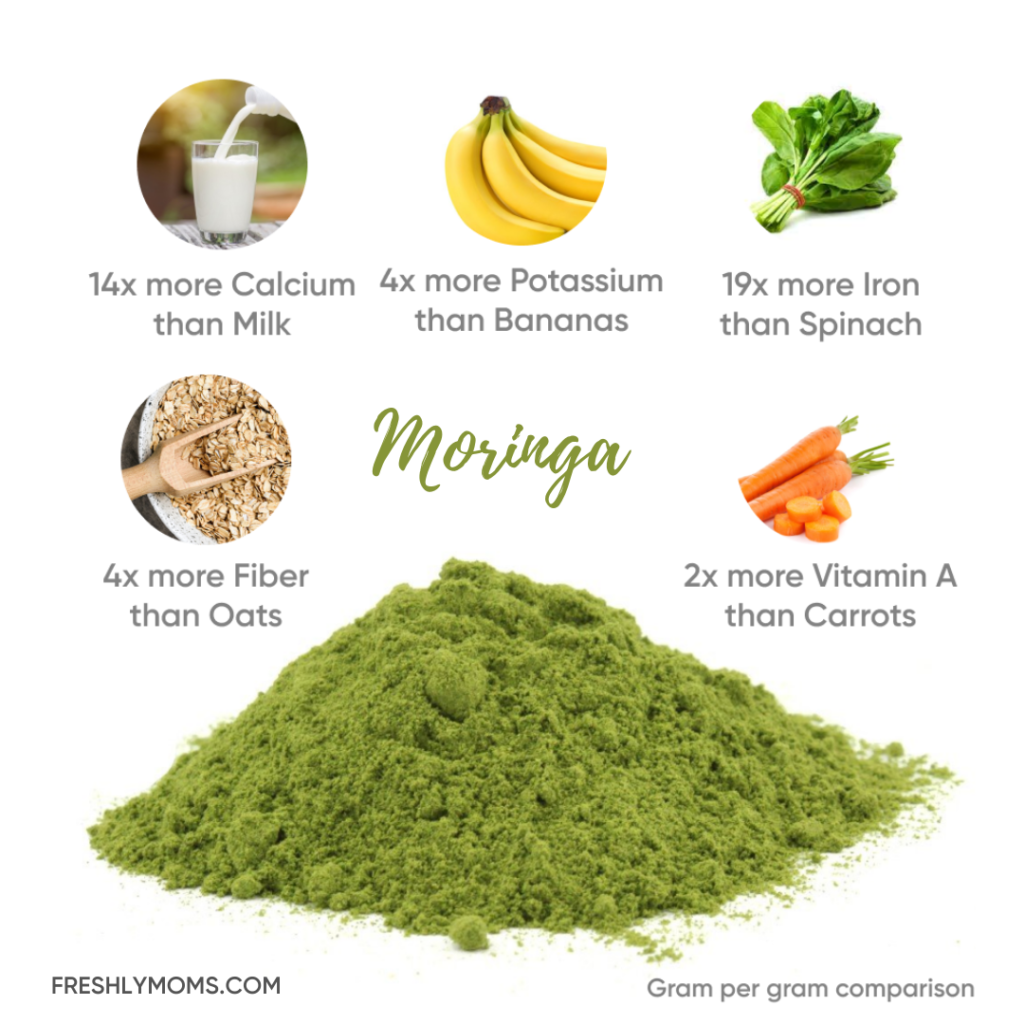
The Origins and History of Moringa
Moringa, scientifically known as Moringa oleifera, has a fascinating history deeply rooted in the cultures and traditions of its native regions, primarily South Asia and the Indian subcontinent. Here’s a glimpse into the captivating journey of this extraordinary tree:
Ancient Roots
Moringa’s history dates back thousands of years, with documented use in ancient civilizations. In India, where it is believed to have originated, Moringa was revered for its therapeutic properties and nutritional benefits. Ancient texts, including Ayurvedic writings, mention the various uses of Moringa leaves, pods, and seeds for medicinal purposes.
Cultural Significance
Throughout history, Moringa has held cultural significance in many societies. It was not only considered a source of nourishment but also symbolized vitality and well-being. In some cultures, Moringa was even regarded as a “miracle tree” due to its ability to thrive in diverse climates and provide sustenance during times of scarcity.
Ancient Remedies
In traditional medicine systems such as Ayurveda and Traditional Chinese Medicine (TCM), Moringa was used to treat various ailments. Its leaves and roots were applied to alleviate digestive issues, reduce inflammation, and promote overall health. Moringa’s diverse medicinal uses earned it a place of honor in the pharmacopoeias of these ancient healing traditions.
Global Spread
As civilizations expanded and traded goods, Moringa found its way to other parts of the world. It spread to regions in Africa, the Middle East, and even the Caribbean, adapting to different climates and becoming an integral part of local diets.
Modern Rediscovery
While Moringa remained a vital part of traditional medicine for centuries, it experienced a renaissance in recent years as modern science began uncovering its nutritional composition. Researchers have conducted extensive studies on Moringa, confirming its status as a nutrient-rich superfood. This newfound recognition has sparked a global interest in Moringa and its potential health benefits.
Today, Moringa continues to flourish in both its native regions and beyond. Its adaptability, fast growth, and remarkable nutritional content make it a valuable resource for addressing malnutrition and improving overall health in communities worldwide. Moreover, the cultivation and commercialization of Moringa have created economic opportunities for many regions, further solidifying its place in history as a truly remarkable tree.
In summary, the origins and history of Moringa are deeply intertwined with the cultural and medicinal practices of ancient civilizations. From its roots in South Asia to its global spread, Moringa has stood the test of time, offering both sustenance and healing to those who have cherished its presence for millennia.
Nutrient Breakdown: What’s Inside Moringa Powder
Moringa powder, derived from the leaves of the Moringa oleifera tree, is nothing short of a nutritional powerhouse. This vibrant green powder is a treasure trove of essential nutrients that can significantly contribute to your overall health and well-being. Here’s a detailed breakdown of what you’ll find inside Moringa powder:
Vitamins
1. Vitamin A: Moringa powder is exceptionally rich in vitamin A, with just one serving providing a significant portion of your daily recommended intake. Vitamin A is crucial for maintaining healthy vision, promoting skin health, and supporting your immune system.
2. Vitamin C: Known for its immune-boosting properties, vitamin C is abundant in Moringa powder. It helps protect cells from oxidative stress, aids in collagen production, and enhances your body’s ability to absorb iron.
3. Vitamin E: Moringa contains a substantial amount of vitamin E, a potent antioxidant that helps protect cells from damage caused by free radicals. This vitamin also plays a role in skin health and maintaining healthy eyes.
Minerals
1. Calcium: Moringa is an excellent source of calcium, essential for strong bones and teeth, muscle function, and nerve transmission. It’s particularly valuable for individuals seeking dairy-free sources of this vital mineral.
2. Potassium: High in potassium, Moringa powder contributes to regulating blood pressure, fluid balance, and muscle contractions. A potassium-rich diet can support heart health and reduce the risk of stroke.
3. Iron: Iron is crucial for carrying oxygen in the blood and preventing fatigue and anemia. Moringa provides a plant-based source of iron that’s easily absorbed by the body.
Amino Acids
Moringa is unique among plants as it contains all nine essential amino acids. These amino acids are the building blocks of proteins and are essential for various bodily functions, including muscle growth, tissue repair, and the production of enzymes and hormones.
Antioxidants
Moringa powder is loaded with antioxidants, including:
1. Quercetin: An antioxidant with anti-inflammatory properties that helps combat oxidative stress and inflammation in the body.
2. Chlorogenic Acid: Known for its potential to lower blood sugar levels and improve overall metabolic health.
3. Beta-Carotene: A precursor to vitamin A, beta-carotene plays a crucial role in maintaining healthy skin, vision, and immune function.
4. Flavonoids: These compounds contribute to the antioxidant properties of Moringa, further protecting your cells from damage.
Fiber
Moringa powder contains dietary fiber, which supports digestive health by promoting regular bowel movements and preventing constipation. Fiber also helps stabilize blood sugar levels and contributes to a feeling of fullness, aiding in weight management.
Protein
Moringa is an excellent source of plant-based protein, making it an ideal choice for vegetarians and vegans. Protein is essential for building and repairing tissues, supporting muscle growth, and maintaining overall body functions.
In summary, Moringa powder is a nutritional marvel that encompasses a wide range of vitamins, minerals, amino acids, and antioxidants. Whether you’re looking to boost your immune system, improve your skin and hair, or increase your overall energy levels, Moringa powder provides a convenient and natural solution. Adding this superfood to your daily routine can help you unlock the numerous health benefits it offers.
Health Benefits of Moringa Powder
Moringa powder, derived from the leaves of the Moringa oleifera tree, is celebrated for its exceptional health benefits. This nutrient-rich superfood has been cherished for centuries in traditional medicine, and modern science has validated many of its therapeutic properties. Here are some of the remarkable health benefits of Moringa powder:
1. Rich in Antioxidants: Shielding Your Cells
Moringa powder is a powerhouse of antioxidants, including quercetin, chlorogenic acid, and beta-carotene. These antioxidants play a vital role in protecting your cells from oxidative stress caused by free radicals. By neutralizing these harmful molecules, Moringa helps reduce the risk of chronic diseases and supports overall health.
2. Boosting Immunity: A Stronger Defense
Regular consumption of Moringa powder can strengthen your immune system. It contains immune-boosting compounds like beta-carotene and vitamin C, which enhance the body’s natural defense mechanisms. A robust immune system helps your body fight off infections and illnesses effectively.
3. Natural Energy Boost: Goodbye, Fatigue!
If you often find yourself feeling fatigued, Moringa powder may offer a natural solution. It is a rich source of iron, a mineral essential for carrying oxygen in the blood. Iron deficiency can lead to fatigue and reduced energy levels. Incorporating Moringa into your diet can help combat tiredness and keep you feeling revitalized throughout the day.
4. Supporting Healthy Skin and Hair: Beauty from Within
The vitamins, minerals, and amino acids in Moringa powder promote healthy skin and hair. These nutrients nourish your skin, combat acne, and improve overall skin texture. Additionally, they strengthen hair follicles, reducing hair fall and enhancing the health and appearance of your hair.
5. Nutrient-Packed Convenience: Easy to Incorporate
One of the significant advantages of Moringa powder is its convenience. It can be easily added to your daily diet. Whether you blend it into smoothies, brew it as tea, or incorporate it into your cooking, Moringa offers a simple and delicious way to increase your nutrient intake.
6. Potential Anti-Inflammatory Effects
Some studies suggest that Moringa may have anti-inflammatory properties, which can help reduce inflammation in the body. Chronic inflammation is linked to various health issues, including heart disease, arthritis, and certain cancers. Incorporating Moringa into your diet may contribute to a healthier inflammatory response.
7. Nutrient-Dense Weight Management
Moringa powder is a low-calorie, nutrient-dense food. It provides essential nutrients while keeping calorie intake in check. For individuals looking to manage their weight and maintain a balanced diet, Moringa can be a valuable addition to their nutritional regimen.
Incorporating Moringa powder into your daily routine can be a simple yet effective way to enhance your overall health and well-being. Whether you’re seeking to strengthen your immune system, improve your skin and hair, or increase your energy levels, this versatile superfood has something to offer. As with any dietary change, it’s advisable to consult with a healthcare professional before adding Moringa powder to your routine, especially if you have underlying health conditions or are pregnant.
How to Use Moringa Powder in Your Diet
Moringa powder, with its rich nutrient profile, is a versatile superfood that can be easily integrated into your daily diet. Here are some delightful and nutritious ways to enjoy the benefits of Moringa powder:
1. Moringa Smoothie: A Nutrient-Packed Breakfast
Start your day with a nutritious Moringa smoothie. Blend Moringa powder with your favorite fruits, such as bananas, berries, or mangoes, along with Greek yogurt or almond milk for creaminess. Add a drizzle of honey or a splash of maple syrup for sweetness. This breakfast smoothie not only provides a burst of vitamins and minerals but also offers a refreshing and energizing start to your morning.
2. Moringa Tea: A Soothing Sip of Health
Brew a cup of Moringa tea for a soothing and health-boosting beverage. Simply add a teaspoon of Moringa powder to a cup of hot water, stir, and let it steep for a few minutes. You can enhance the flavor by adding a touch of lemon or honey if desired. Enjoy this herbal tea as a calming and nutritious alternative to your regular tea or coffee.
3. Moringa in Cooking: Adding a Nutty Twist
Get creative in the kitchen by incorporating Moringa powder into your cooking. Here are some ideas:
- Moringa Pesto: Blend Moringa powder with fresh basil, garlic, pine nuts, Parmesan cheese, olive oil, and a pinch of salt to create a vibrant and nutritious pesto sauce. Toss it with pasta or use it as a dip for bread or vegetables.
- Moringa Soups and Stews: Add a teaspoon of Moringa powder to your favorite soups or stews. Its mild, nutty flavor blends well with savory dishes and enhances their nutritional value.
- Moringa Baking: Experiment with baking by incorporating Moringa powder into recipes for muffins, pancakes, or energy bars. It adds a subtle earthy flavor and a nutrient boost to your baked goods.
- Moringa Salad Dressing: Mix Moringa powder with olive oil, vinegar, lemon juice, and your choice of herbs and spices to create a healthy and flavorful salad dressing.
4. Moringa Snacks: On-the-Go Nutrition
Create nutritious snacks with Moringa powder to satisfy your mid-day cravings. You can sprinkle it over popcorn, mix it into yogurt or oatmeal, or even add it to homemade energy balls or protein bars. These snacks provide a quick energy boost and are packed with essential nutrients.
5. Moringa Seasoning: Flavorful Boost
Use Moringa powder as a seasoning or garnish for a nutritional punch. You can sprinkle it on roasted vegetables, rice dishes, or grilled meats to infuse a subtle, earthy flavor while adding extra vitamins and minerals to your meals.
6. Moringa Ice Cream or Sorbet: A Refreshing Treat
If you enjoy making homemade ice cream or sorbet, consider adding Moringa powder to your recipes. Its vibrant green color and mild taste make it a unique and nutritious addition to frozen desserts.
When using Moringa powder in your recipes, start with a small amount and gradually increase it to suit your taste preferences. Remember that a little goes a long way due to its concentrated nutrient content. By incorporating Moringa powder into your diet in these creative ways, you can enjoy its numerous health benefits while adding a delightful twist to your meals and snacks.
Buying and Storing Moringa Powder: Tips and Tricks
- Choose a Reputable Brand: When purchasing Moringa powder, opt for a reputable brand that is known for its quality and transparency. Look for brands that source their Moringa from trusted suppliers and follow ethical and sustainable practices.
- Certifications: Check for certifications such as organic, non-GMO, and fair trade. These certifications indicate that the Moringa powder has met certain standards and is less likely to contain contaminants.
- Read Labels: Read the product label carefully to ensure that you are buying pure Moringa powder with no additives, fillers, or preservatives. The ingredient list should list only Moringa oleifera leaf powder.
- Color and Aroma: High-quality Moringa powder should have a vibrant green color and a fresh, earthy aroma. Avoid products that appear dull or have a musty odor, as this may indicate lower quality.
- Packaging: Look for Moringa powder that is packaged in airtight containers or resealable bags to maintain freshness. Light and air can degrade the quality of the powder, so opt for opaque or dark packaging.
- Check for Testing: Some brands may provide lab testing results for their products, ensuring that they are free from contaminants and meet quality standards. If available, review these test results for peace of mind.

Storing Moringa Powder
- Store in an Airtight Container: Once you’ve opened the package, transfer the Moringa powder to an airtight container to protect it from exposure to air and moisture. Make sure the container is clean and dry before adding the powder.
- Keep in a Cool, Dark Place: Store the container in a cool, dark place away from direct sunlight and heat. Exposure to light and heat can degrade the nutritional value of the powder.
- Avoid Humidity: Moringa powder can absorb moisture from the air, leading to clumping and a shortened shelf life. Keep it away from humid environments, and consider adding a desiccant packet to the container to absorb any excess moisture.
- Label and Date: To keep track of the freshness of your Moringa powder, label the container with the purchase date. This will help you ensure that you use it within its recommended shelf life.
- Refrigeration (Optional): While not necessary, some people prefer to refrigerate their Moringa powder to extend its shelf life. If you choose to do so, ensure that it’s in an airtight container to prevent condensation.
- Use Quickly: Moringa powder is at its peak freshness when first opened. Aim to use it within six months to a year for the best flavor and nutrient retention.
- Avoid Contamination: Always use a clean, dry utensil when scooping out Moringa powder to prevent contamination. Moisture and foreign particles can compromise the quality of the powder.
By following these buying and storing tips, you can ensure that your Moringa powder remains fresh, flavorful, and packed with its valuable nutrients for an extended period, allowing you to enjoy its health benefits to the fullest.
Potential Side Effects and Precautions
- Digestive Issues: Some individuals may experience digestive discomfort when consuming Moringa powder, especially in larger quantities. Common side effects can include diarrhea, nausea, and stomach cramps. To minimize the risk of digestive issues, start with a small amount of Moringa powder and gradually increase your intake over time.
- Interference with Medications: Moringa may interact with certain medications, including blood-thinners, blood pressure medications, and diabetes medications. If you are taking any prescription drugs, consult with your healthcare provider before adding Moringa powder to your diet to ensure there are no adverse interactions.
- Allergic Reactions: While rare, some individuals may be allergic to Moringa. If you have known allergies to plants in the Moringaceae family, such as ragweed, marigolds, or daisies, exercise caution and consider consulting an allergist before using Moringa powder.
- Pregnancy and Breastfeeding: Pregnant and breastfeeding women should approach Moringa powder with caution. While it is generally considered safe, there is limited research on its effects during pregnancy and lactation. It’s advisable to consult with a healthcare professional before incorporating it into your diet during these periods.
- Excessive Intake: Consuming extremely high doses of Moringa powder may lead to adverse effects. Stick to recommended serving sizes, which typically range from 1 to 3 teaspoons (about 5 to 15 grams) per day. Excessive intake may result in negative symptoms, including digestive upset.
Precautions:
- Consult a Healthcare Professional: Before adding Moringa powder to your diet, especially if you have underlying health conditions or are pregnant, consult with a healthcare provider or registered dietitian. They can provide personalized guidance and ensure it is safe for your specific circumstances.
- Monitor Your Body’s Response: Pay attention to how your body responds to Moringa powder. If you experience any adverse effects, discontinue use and consult a healthcare professional.
- Moderation is Key: Like with any dietary supplement, moderation is essential. A little Moringa powder goes a long way due to its concentrated nutrient content. Avoid excessive consumption and adhere to recommended serving sizes.
- Quality Matters: Choose high-quality Moringa powder from reputable brands to minimize the risk of contaminants and ensure product purity.
- Rotate with Other Foods: Instead of relying solely on Moringa powder for your nutritional needs, incorporate a variety of nutrient-rich foods into your diet. This diversity helps provide a broad spectrum of vitamins, minerals, and antioxidants.
- Maintain a Balanced Diet: Moringa powder should complement a balanced diet, not replace it. Continue to eat a wide range of fruits, vegetables, whole grains, lean proteins, and other nutrient-dense foods for overall health.
By following these precautions and being mindful of your body’s response, you can safely enjoy the health benefits of Moringa powder while minimizing potential side effects. Always seek professional guidance when in doubt, especially if you have specific health concerns or medical conditions.
Moringa Marvel Success Stories: Real-Life Experiences
1. Sarah’s Energy Boost
Sarah, a busy mother of two, was struggling to keep up with her daily responsibilities due to constant fatigue. She decided to give Moringa powder a try after hearing about its energy-boosting properties. Within a few weeks of adding Moringa to her morning smoothie, Sarah noticed a significant improvement in her energy levels. She was better able to tackle her daily tasks and even found the energy to start jogging again. Sarah credits Moringa for giving her the vitality she needed to juggle her family and work commitments.
2. Michael’s Skin Transformation
Michael had struggled with acne and uneven skin tone for years. He had tried various skincare products with limited success. Desperate for a solution, he began researching natural remedies and came across Moringa powder. After incorporating Moringa into his diet and using it as a face mask, Michael noticed a remarkable improvement in his skin. His acne cleared up, and his complexion became noticeably smoother and more radiant. Moringa had become his secret to achieving the clear, healthy skin he had always desired.
3. Maria’s Weight Management Journey
Maria had been on a weight loss journey for some time but had hit a plateau. She was looking for ways to support her weight management efforts when she discovered Moringa powder. By adding a teaspoon of Moringa to her daily green smoothies, Maria found that she felt fuller for longer, reducing her snacking between meals. Additionally, the boost in energy from Moringa encouraged her to stay active. Over several months, Maria successfully shed the extra pounds she had been struggling with, and she continues to maintain her healthy weight with the help of Moringa.
4. David’s Immune System Reinforcement
David, a retiree, was concerned about his immune system’s health, especially during the winter months. He decided to try Moringa powder as a natural way to boost his immunity. After incorporating Moringa into his daily routine, David experienced fewer colds and flu-like symptoms. He attributes his improved immune system to the regular intake of Moringa and appreciates the peace of mind it gives him, knowing he is better equipped to ward off illnesses.
5. Lisa’s Journey to Better Hair
Lisa had been struggling with hair loss and fragile, dull hair for years. She was looking for a natural solution when she came across Moringa powder. Lisa began adding Moringa to her diet and also used it as a hair mask. Over time, she noticed a significant reduction in hair fall and an improvement in hair thickness and shine. Lisa’s hair transformation became a confidence booster, and she couldn’t be happier with the results.
These real-life success stories highlight the diverse ways in which individuals have experienced positive changes in their health and well-being after incorporating Moringa powder into their daily lives. While these experiences are inspiring, it’s essential to remember that individual results may vary, and Moringa should be used in conjunction with a balanced diet and a healthy lifestyle. If you’re considering adding Moringa to your routine, consult with a healthcare professional to ensure it aligns with your specific health goals and needs.
Moringa vs. Other Superfoods: A Comparative Analysis
Superfoods are nutrient-dense foods that offer exceptional health benefits due to their rich content of vitamins, minerals, antioxidants, and other bioactive compounds. Here, we’ll compare Moringa with some other popular superfoods to see how they stack up in terms of nutritional value and potential health benefits:
Moringa vs. Spirulina
Moringa:
- Rich in vitamins A, C, and E.
- Contains a wide range of B vitamins, including B1, B2, B3, and B6.
- High in minerals such as calcium, potassium, and iron.
- Provides all nine essential amino acids, making it a complete protein source.
- Abundant in antioxidants like quercetin, chlorogenic acid, and beta-carotene.
- May help boost energy, support skin health, and strengthen the immune system.
Spirulina:
- Exceptionally high in protein, containing all essential amino acids.
- A good source of B vitamins, especially B1 (thiamine) and B2 (riboflavin).
- Rich in minerals like iron and copper.
- Contains phycocyanin, a powerful antioxidant with anti-inflammatory properties.
- Known to support heart health, improve allergies, and enhance endurance.
- May help detoxify the body due to its chlorophyll content.
Moringa vs. Chlorella
Moringa:
- Offers a wide array of vitamins, including vitamin A, C, and E.
- Contains essential minerals like calcium, potassium, and iron.
- Rich in antioxidants, including quercetin and chlorogenic acid.
- A source of complete protein with all nine essential amino acids.
- Supports energy levels, skin health, and immune function.
Chlorella:
- High in protein, including all essential amino acids.
- Rich in chlorophyll, which may help detoxify the body.
- Contains vitamins such as B1, B2, B3, and B6.
- A source of essential minerals like iron, magnesium, and zinc.
- Known to support immune health, improve digestion, and promote weight loss.
- May enhance overall well-being due to its nutrient density.
Moringa vs. Matcha
Moringa:
- Offers a broad spectrum of vitamins, including A, C, and E.
- Contains essential minerals like calcium, potassium, and iron.
- Abundant in antioxidants like quercetin and beta-carotene.
- A source of complete protein with all nine essential amino acids.
- Supports energy levels, skin health, and immune function.
Matcha:
- Rich in antioxidants, particularly catechins, which may help with cell repair.
- Contains caffeine, providing a natural energy boost and mental alertness.
- A source of vitamins like vitamin C and vitamin A.
- Promotes relaxation and may enhance concentration.
- Known to support metabolism and weight management.
- May improve heart health and reduce the risk of certain diseases.
In summary, Moringa stands out as a superfood with a well-rounded nutritional profile. It offers a wide range of vitamins, minerals, antioxidants, and complete protein, making it a versatile and nutrient-dense choice. While other superfoods like spirulina, chlorella, and matcha have their own unique strengths and benefits, Moringa’s balanced combination of nutrients makes it a valuable addition to a healthy diet. However, the choice between these superfoods ultimately depends on individual dietary preferences and health goals.
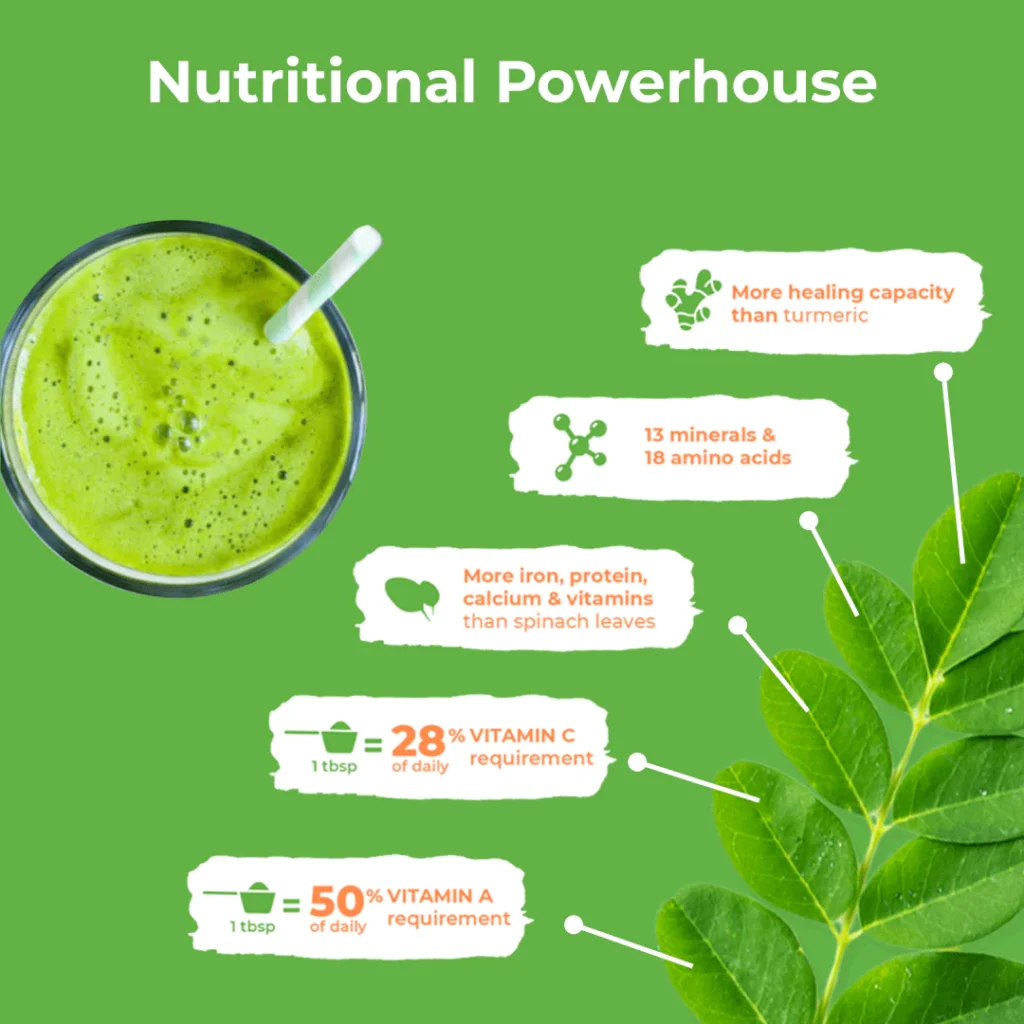
The Environmental and Economic Impact of Moringa
Moringa’s sustainability and economic benefits make it a valuable crop in many regions. Learn how its cultivation can positively impact the environment and local economies.
Source to Get Organic Moringa Leaf Powder Capsules
Frequently Asked Questions (FAQs)
Is Moringa powder safe for children and pregnant women?
Moringa powder is generally safe for most people, including children and pregnant women, when consumed in moderation. However, it’s advisable to consult a healthcare professional before adding it to your diet during pregnancy.
Can Moringa powder help with weight loss?
While Moringa powder can support a healthy diet, it is not a magic weight loss solution. It can aid in overall well-being and energy levels, but a balanced diet and exercise are essential for sustainable weight loss.
How does Moringa compare to other superfoods like spirulina and chlorella?
Moringa, spirulina, and chlorella are all nutrient-rich superfoods, but they have different compositions. Moringa is known for its high vitamin and mineral content, while spirulina and chlorella are rich in protein and chlorophyll. The choice depends on your specific nutritional needs.
What is the recommended daily dosage of Moringa powder?
The recommended daily dosage of Moringa powder typically ranges from 1 to 3 teaspoons (about 5 to 15 grams). However, individual needs may vary, so it’s advisable to start with a smaller amount and adjust as needed.
Where can I purchase high-quality Moringa powder?
You can find high-quality Moringa powder from reputable health food stores, online retailers, or specialty organic stores. Ensure the product is certified organic and undergoes rigorous quality testing.
Conclusion
Moringa powder is indeed a marvel of nature, offering an abundance of health benefits in a convenient and versatile form. Whether you’re looking to boost your immunity, improve your skin, or increase your energy levels, Moringa powder has something to offer. By incorporating this superfood into your daily routine, you’re taking a step toward a healthier and more vibrant you.
